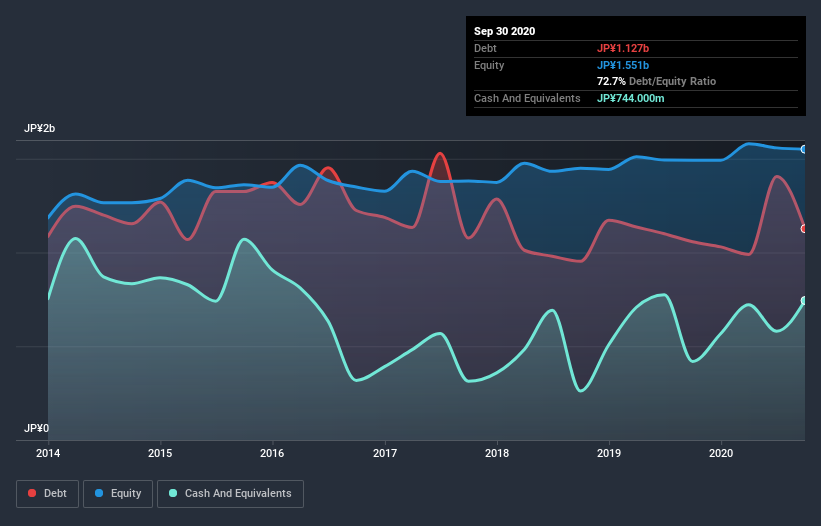
Warren Buffett famously said, 'Volatility is far from synonymous with risk.' So it seems the smart money knows that debt - which is usually involved in bankruptcies - is a very important factor, when you assess how risky a company is. As with many other companies Japan Publications Trading Co., Ltd. (TYO:8072) makes use of debt. But should shareholders be worried about its use of debt?
When Is Debt A Problem?
Debt and other liabilities become risky for a business when it cannot easily fulfill those obligations, either with free cash flow or by raising capital at an attractive price. In the worst case scenario, a company can go bankrupt if it cannot pay its creditors. However, a more usual (but still expensive) situation is where a company must dilute shareholders at a cheap share price simply to get debt under control. Of course, the upside of debt is that it often represents cheap capital, especially when it replaces dilution in a company with the ability to reinvest at high rates of return. When we think about a company's use of debt, we first look at cash and debt together.
View our latest analysis for Japan Publications Trading
What Is Japan Publications Trading's Debt?
As you can see below, at the end of September 2020, Japan Publications Trading had JP¥1.13b of debt, up from JP¥1.06b a year ago. Click the image for more detail. On the flip side, it has JP¥744.0m in cash leading to net debt of about JP¥383.0m.

A Look At Japan Publications Trading's Liabilities
According to the last reported balance sheet, Japan Publications Trading had liabilities of JP¥2.28b due within 12 months, and liabilities of JP¥665.0m due beyond 12 months. Offsetting these obligations, it had cash of JP¥744.0m as well as receivables valued at JP¥1.27b due within 12 months. So it has liabilities totalling JP¥940.0m more than its cash and near-term receivables, combined.
Given this deficit is actually higher than the company's market capitalization of JP¥917.1m, we think shareholders really should watch Japan Publications Trading's debt levels, like a parent watching their child ride a bike for the first time. Hypothetically, extremely heavy dilution would be required if the company were forced to pay down its liabilities by raising capital at the current share price.
We measure a company's debt load relative to its earnings power by looking at its net debt divided by its earnings before interest, tax, depreciation, and amortization (EBITDA) and by calculating how easily its earnings before interest and tax (EBIT) cover its interest expense (interest cover). The advantage of this approach is that we take into account both the absolute quantum of debt (with net debt to EBITDA) and the actual interest expenses associated with that debt (with its interest cover ratio).
Japan Publications Trading's net debt to EBITDA ratio of about 2.0 suggests only moderate use of debt. And its strong interest cover of 35.0 times, makes us even more comfortable. One way Japan Publications Trading could vanquish its debt would be if it stops borrowing more but continues to grow EBIT at around 16%, as it did over the last year. When analysing debt levels, the balance sheet is the obvious place to start. But you can't view debt in total isolation; since Japan Publications Trading will need earnings to service that debt. So if you're keen to discover more about its earnings, it might be worth checking out this graph of its long term earnings trend.
Finally, a business needs free cash flow to pay off debt; accounting profits just don't cut it. So we clearly need to look at whether that EBIT is leading to corresponding free cash flow. Over the last three years, Japan Publications Trading actually produced more free cash flow than EBIT. There's nothing better than incoming cash when it comes to staying in your lenders' good graces.
Our View
Both Japan Publications Trading's ability to to cover its interest expense with its EBIT and its conversion of EBIT to free cash flow gave us comfort that it can handle its debt. On the other hand, its level of total liabilities makes us a little less comfortable about its debt. Considering this range of data points, we think Japan Publications Trading is in a good position to manage its debt levels. But a word of caution: we think debt levels are high enough to justify ongoing monitoring. When analysing debt levels, the balance sheet is the obvious place to start. But ultimately, every company can contain risks that exist outside of the balance sheet. For example, we've discovered 2 warning signs for Japan Publications Trading (1 is a bit concerning!) that you should be aware of before investing here.
If you're interested in investing in businesses that can grow profits without the burden of debt, then check out this free list of growing businesses that have net cash on the balance sheet.
If you’re looking to trade Japan Publications Trading, open an account with the lowest-cost* platform trusted by professionals, Interactive Brokers. Their clients from over 200 countries and territories trade stocks, options, futures, forex, bonds and funds worldwide from a single integrated account. Promoted
New: Manage All Your Stock Portfolios in One Place
We've created the ultimate portfolio companion for stock investors, and it's free.
• Connect an unlimited number of Portfolios and see your total in one currency
• Be alerted to new Warning Signs or Risks via email or mobile
• Track the Fair Value of your stocks
This article by Simply Wall St is general in nature. It does not constitute a recommendation to buy or sell any stock, and does not take account of your objectives, or your financial situation. We aim to bring you long-term focused analysis driven by fundamental data. Note that our analysis may not factor in the latest price-sensitive company announcements or qualitative material. Simply Wall St has no position in any stocks mentioned.
*Interactive Brokers Rated Lowest Cost Broker by StockBrokers.com Annual Online Review 2020
Have feedback on this article? Concerned about the content? Get in touch with us directly. Alternatively, email editorial-team@simplywallst.com.
About TSE:8072
Japan Publications Trading
Imports, sells, and exports general and academic books and periodicals, language learning textbooks and materials, audio/visual discs, and other general merchandise.
Excellent balance sheet with acceptable track record.
Market Insights
Community Narratives




